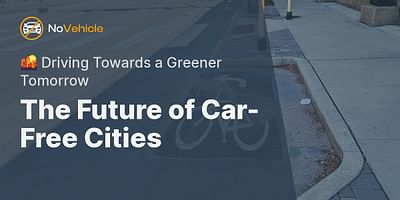Zoe is a writer and environmental activist who is passionate about sustainable living and reducing her carbon footprint. She has been living a car-free lifestyle for several years and enjoys exploring new destinations by foot, bike, and public transportation.
Hey there! Thanks for reaching out with such an important question. As someone who's passionate about sustainable living and reducing my carbon footprint, I wholeheartedly believe that cities should invest in alternative transportation. Let me break it down for you.
First and foremost, investing in alternative transportation, such as public transit systems, bike lanes, and pedestrian-friendly infrastructure, brings a multitude of benefits. One of the most significant advantages is the positive impact on the environment. By reducing the number of cars on the road, cities can significantly decrease air pollution and greenhouse gas emissions. This not only helps combat climate change but also improves air quality, making our cities healthier and more enjoyable places to live.
But the benefits don't stop there. Investing in alternative transportation also has numerous social and economic advantages. For starters, it enhances accessibility for everyone, regardless of income or physical ability. Public transit systems provide affordable and convenient transportation options, allowing people to access job opportunities, education, healthcare, and recreational activities. This promotes social equity and reduces the burden on low-income individuals who may not be able to afford a car.
From an economic standpoint, investing in alternative transportation can have a positive impact on local businesses. When cities prioritize public transit and create pedestrian-friendly environments, it encourages people to spend more time in commercial areas, supporting local shops and restaurants. Additionally, reducing traffic congestion can improve productivity and efficiency, benefiting both businesses and individuals.
Now, let's talk about urban living without a car. Many cities around the world are embracing car-free lifestyles and creating environments that cater to pedestrians and cyclists. These cities prioritize public transportation, making it easy to get around without a car. Some of the best cities for car-free living include Copenhagen, Amsterdam, and Barcelona, just to name a few. These cities offer extensive public transit networks, bike-sharing programs, and pedestrian-friendly streets, making it a breeze to explore and commute without a car.
If you're looking for car-free travel destinations, there are plenty of options to choose from. Whether it's beach camping, hiking in national parks, or exploring vibrant urban areas, there are countless destinations that are easily accessible without a car. From the stunning coastline of Oregon to the bustling streets of New York City, you can experience the best of what these places have to offer while minimizing your impact on the environment.
In conclusion, investing in alternative transportation is a win-win situation. It benefits the environment, promotes social equity, boosts local economies, and enhances the overall quality of life in cities. So, let's encourage our cities to prioritize public transit, bike lanes, and pedestrian-friendly infrastructure. Together, we can create more sustainable and livable communities for everyone.















